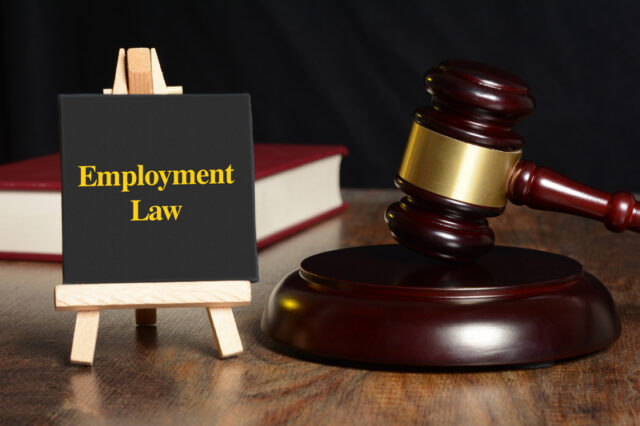
For most of us, our jobs are our life. Not in the sense that everything else’s is irrelevant and you only have to focus on work, but in a sense where our lives literally depend on it. And, the sad truth is, some employers know that that means they can take advantage of it.
Fortunately, we don’t live in anarchy, and there are laws put in place to protect both the employees and the employers. However, these laws aren’t any good if you don’t know anything about them.
On that note, we’ve decided you let you in on a few things about labor and employment law you absolutely need to know. So, without further ado – let’s check them out.
1. You Could Get Fired For No Reason

Employment laws protect both employers and employees, and the perfect example of that is the fact that your employer can fire you, at will, for no apparent reason, and suffer no consequences for it. To make things even worse, they don’t even have to tell you why they’re firing you.
On that note, there is an exception, or better yet, a few exceptions to this rule.
Number one, your employer can’t fire you because of your race, sex, skin color, gender, sexual orientation or identity, religion, age, disability, medical condition or marital status. If you suspect that you’ve been fired for any of these – you have grounds for a lawsuit.
Also, your employer can’t fire you as a result of you reporting them to the police or another government agency or if you’re trying to file a claim against them. All of this would be considered unlawful termination and would give you the grounds for a lawsuit.
Finally, if your termination in any way violates your contract – they can’t fire you without a cause. If they do – you can turn to Levitt LLP for help.
2. You Must Be Granted Access To Your Personnel File

Regardless of your current status of employment, if you ask your current or former employer to take a look at your personnel file – they have to give it to you. A personnel file contains information about the employee, including personal information, job performance reviews, and more, which means you are entitled to a copy of the file.
It is illegal for employers to withhold personnel files from their current and former employers. They must provide a copy of the personnel file in a reasonable amount of time. Otherwise, they would be subject to legal action.
Also, it is perfectly within your rights to add your own documents to your personnel file, as we all ask for some documents to be removed from the file if you have proof that they’re not true.
3. You May Receive Additional Compensation If Your Final Wages Are Late

If you get fired, your employer will have to pay you all that is owed immediately upon termination of your contract. We’re not talking about severance pay – we’re talking about your wages. On the other hand, if you quit and give your employer your three-day notice – your employer must pay you your wages on your last day.
If you quit without giving a three-day notice, you are entitled to your wages within the next three days. If you don’t get paid, your employer is subject to paying you additional compensation for each day you wait – up until 30 days.
4. You Are Entitled To Your Vacation Pay If You Haven’t Used It

Even if you lose your job, regardless of whether you got fired or you quit, you are entitled to your unused vacation pay. It is illegal for your former employer not to pay you your unused vacation wages just because you haven’t used them. So, the “use it or lose it” vacation policy will not stand under any circumstances.
However, you can’t just collect your paid vacation over a long period of time. To be fair, you can, but it is also perfectly within your employer’s rights to put a cap on the total amount you can amass over time.
5. It Is Illegal For Your Employer To Give Out False Bad References

While it is not illegal for your employer to “bad-mouth” you when they give out a reference, it is illegal for them to lie if the things they’re saying could potentially hurt you. They are perfectly within their rights to lie on your behalf if they are saying good things about you, but they can’t do it the other way around.
However, they can be as critical of you as possible if what they’re saying is true. However, seeing how there’s a really fine line that they have to walk here, most employers won’t even give out a reference unless it is a good one and you ask them to.
6. You Can Refuse To Do Dangerous Work

It is perfectly within your rights to refuse to do your job if you feel like doing it might affect your health or well-being or if it jeopardizes your general safety. However, you can’t just up and leave – you have to inform your employer of your decision and give them a chance to make things right.
In the events that your employer does not succeed in fixing the things that are making your work environment safe, and you once again decide to refuse to do the work, you should once again inform them of your decision, only this time you should do it writing or in front of witnesses. At that point, you may continue to refuse to do your work as long as the situation is not fixed and the work environment is made safe.
7. You Can’t Be Financially Punished For An Honest Mistake

Your employer can’t deduct money from your wages because of an error if the error you have made was an honest one. The only way you can suffer a pay cut because of an error is if your employer can prove that what you did was premeditated or done in wilful misconduct or gross negligence.
Conclusion
Naturally, these are not the only things you should know about employment law, but they are some of the most important ones you should be aware of. Hopefully, you’ve learned a few things today, and if you did – we’re glad we’ve been able to help.












